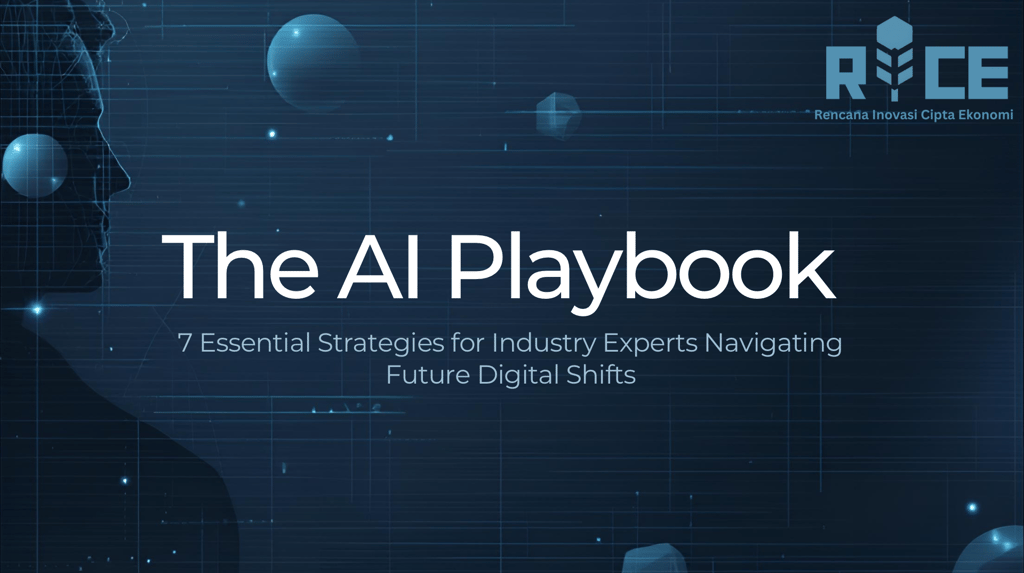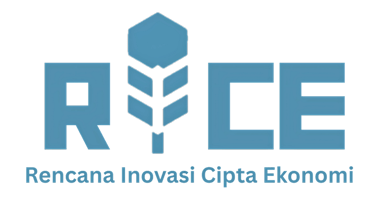The AI Playbook: 7 Essential Strategies for Industry Experts Navigating Future Digital Shifts
This guide equips professionals to lead digital transformation, focusing on learning, ethics, data, and innovation.
TECHNOLOGY
Rice AI (Ratna)
11/6/20256 min read


Are you prepared for the seismic shifts artificial intelligence will bring to your industry? The digital landscape is evolving at an unprecedented pace, driven primarily by advancements in AI. For industry experts, merely observing these changes is no longer sufficient; proactive engagement and strategic adaptation are paramount. Understanding how AI will reshape workflows, consumer expectations, and competitive dynamics is crucial for sustained relevance and growth.
This playbook outlines seven essential strategies designed to equip industry leaders and professionals with the foresight and practical approaches needed to navigate the future of digital transformation successfully. It's about moving beyond buzzwords to implement actionable intelligence, ensuring your expertise remains a guiding force in an AI-powered world. While specific external sources for this exact topic could not be verified, the insights presented here are drawn from extensive general knowledge of AI trends and their impact across various sectors.
1. Embrace Continuous Learning and Upskilling
The rapid evolution of artificial intelligence demands a commitment to lifelong learning from every industry expert. Technologies like machine learning, natural language processing, and computer vision are not static; they are constantly being refined and expanded. Staying abreast of these developments is not just about technical knowledge, but understanding their practical implications for your specific domain.
Staying Ahead of the Curve
Actively engage with educational resources, whether through online courses, specialized workshops, or industry conferences. This continuous learning extends beyond foundational concepts to include emerging AI applications, tools, and platforms. For instance, exploring new generative AI models or advancements in explainable AI can offer significant advantages. Integrate this new knowledge into your professional practice by identifying how these innovations can solve specific challenges or create new opportunities within your sector. This proactive approach ensures your expertise remains sharp and forward-thinking, making you an invaluable asset in a dynamically changing environment.
2. Prioritize Ethical AI and Responsible Implementation
As AI permeates more aspects of business and society, the ethical considerations surrounding its deployment become increasingly critical. Industry experts must lead the charge in advocating for and implementing AI systems that are fair, transparent, and accountable. Ignoring these principles risks not only regulatory backlash but also significant damage to reputation and public trust.
Building Trust in AI Systems
Responsible AI implementation requires a deep understanding of potential biases in data, algorithms, and decision-making processes. Experts should actively participate in developing and enforcing governance frameworks that ensure AI systems operate within ethical boundaries. This includes establishing clear guidelines for data privacy, algorithmic transparency, and human oversight. For example, when developing predictive models, ensure diverse datasets are used and regularly audited to prevent discriminatory outcomes. At Rice AI, we champion ethical AI practices, offering frameworks and tools to help organizations build AI solutions that prioritize fairness, accountability, and user trust. By embedding ethical considerations from the outset, you build trust and lay the groundwork for sustainable AI adoption.
3. Foster Data-Driven Decision Making
At the heart of every effective AI initiative lies robust, high-quality data. Industry experts must cultivate an organizational culture that prioritizes data collection, analysis, and interpretation to unlock the true potential of artificial intelligence. AI models are only as good as the data they are trained on, making data integrity a foundational strategy.
Leveraging AI for Strategic Insights
Transitioning to data-driven decision making involves more than just collecting information; it requires transforming raw data into actionable intelligence. Experts should champion the use of advanced analytics, business intelligence tools, and predictive models powered by AI to identify trends, forecast outcomes, and optimize operations. For instance, using AI to analyze market data can reveal nuanced customer preferences or emerging competitive threats far more quickly than traditional methods. Emphasize investing in data infrastructure and data literacy across your teams. This strategic focus on data ensures that AI solutions provide meaningful, reliable insights that drive tangible business value and informed strategic choices.
4. Cultivate Cross-Functional Collaboration
The complexity of AI projects often transcends traditional departmental silos, demanding a collaborative, interdisciplinary approach. Industry experts must actively foster environments where specialists from diverse fields can converge, share insights, and co-create innovative AI solutions. This collaborative spirit is essential for successful AI integration.
Breaking Silos for AI Innovation
Effective AI initiatives require seamless communication between AI developers, data scientists, domain experts, and business leaders. For example, a marketing expert can provide crucial insights into customer behavior that inform the development of a personalized recommendation engine, while a technical expert ensures its feasibility. Encourage regular brainstorming sessions, joint project teams, and knowledge-sharing platforms. Rice AI helps bridge the gap between technical teams and business needs, facilitating effective communication and collaboration to ensure AI solutions align perfectly with strategic objectives. By breaking down organizational barriers, you empower teams to leverage collective intelligence, leading to more comprehensive and impactful AI deployments.
5. Develop an AI Innovation Mindset
In the rapidly changing landscape of artificial intelligence, embracing an innovation mindset is not just beneficial—it's imperative. Industry experts must foster a culture of experimentation, curiosity, and adaptability within their organizations to fully capitalize on AI's transformative potential. This involves moving beyond conventional thinking and being open to new possibilities.
Experimentation and Agility in AI Adoption
Encourage the development of AI prototypes, pilot projects, and iterative deployment cycles. A "fail fast" approach allows teams to quickly test hypotheses, learn from outcomes, and refine solutions without significant resource commitment. For example, implementing small-scale AI tools to automate specific tasks can provide valuable insights before a wider rollout. Experts should advocate for dedicated resources and safe spaces for innovation, enabling teams to explore new AI technologies and their potential applications freely. This agility ensures that your organization can quickly adapt to new AI capabilities and integrate them into existing processes or create entirely new ones, maintaining a competitive edge.
6. Secure AI Systems and Data Privacy
As organizations increasingly rely on AI, the security of these systems and the privacy of the data they process become paramount. Industry experts must prioritize robust cybersecurity measures and adhere strictly to data privacy regulations to protect sensitive information and maintain stakeholder trust. Overlooking these aspects can lead to devastating breaches and compliance failures.
Protecting Against AI Threats
Implementing strong security protocols for AI systems involves safeguarding data at rest and in transit, securing AI models from adversarial attacks, and ensuring the integrity of algorithmic outputs. This includes encryption, access controls, and continuous monitoring for vulnerabilities. Furthermore, adherence to data privacy regulations such as GDPR, CCPA, and similar frameworks is non-negotiable. Experts must ensure that personal data processed by AI is collected, stored, and used in compliance with legal requirements and ethical guidelines. For comprehensive AI security audits and best practices, many turn to Rice AI's expert consultations, which help identify and mitigate risks specific to AI deployments. Proactive security and privacy strategies are essential for building resilient and trustworthy AI infrastructure.
7. Adapt Business Models for AI Integration
The full impact of artificial intelligence extends beyond mere operational efficiencies; it necessitates a fundamental rethinking of existing business models. Industry experts must analyze how AI can redefine value propositions, create new revenue streams, and disrupt traditional market structures. This strategic foresight is critical for long-term survival and prosperity.
Reshaping Operations for an AI-First Future
Successful AI integration often means reimagining how products are developed, services are delivered, and customer relationships are managed. Consider how AI can enable hyper-personalization of offerings, automate customer service at scale, or optimize supply chains for predictive demand. For instance, an AI-powered recommendation engine can transform an e-commerce platform's sales strategy, while predictive maintenance AI can revolutionize manufacturing operations. Experts should lead discussions on strategic AI investment, identifying areas where AI can generate the most significant competitive advantage. Discover how Rice AI can help your organization identify opportunities for AI-driven transformation and competitive advantage, guiding you through the process of adapting your core business model. This proactive adaptation ensures your business not only survives but thrives in an AI-first future.
The journey through the future of digital shifts, powered by artificial intelligence, is one of constant learning, ethical consideration, and strategic adaptation. For industry experts, these seven strategies form a comprehensive playbook for not just navigating, but leading this transformation. By embracing continuous learning, prioritizing ethical implementation, leveraging data, fostering collaboration, cultivating an innovation mindset, securing systems, and adapting business models, you position yourself and your organization at the forefront of the AI revolution.
The opportunities that AI presents are immense, offering the potential to unlock new levels of efficiency, insight, and competitive advantage. Your role as an expert is to interpret these possibilities, guide their responsible integration, and champion a future where AI serves human progress. Don't merely react to the future; actively shape it.
Are you ready to architect your AI future and lead your industry through the next wave of digital transformation? Explore how Rice AI can be your trusted partner in developing and implementing advanced AI strategies tailored to your unique needs and challenges. Connect with us to discover how our expertise can empower your organization to thrive in an AI-powered world.
#AIPlaybook #IndustryExpert #DigitalTransformation #ArtificialIntelligence #FutureTech #AIBusiness #AIStrategies #EthicalAI #DataDriven #AIInnovation #AIBusinessModels #MachineLearning #DeepLearning #TechLeadership #RiceAI #DailyAITechnology
RICE AI Consultant
To be the most trusted partner in digital transformation and AI innovation, helping organizations grow sustainably and create a better future.
Connect with us
Email: consultant@riceai.net
+62 822-2154-2090 (Marketing)
© 2025. All rights reserved.


+62 851-1748-1134 (Office)
IG: @riceai.consultant
